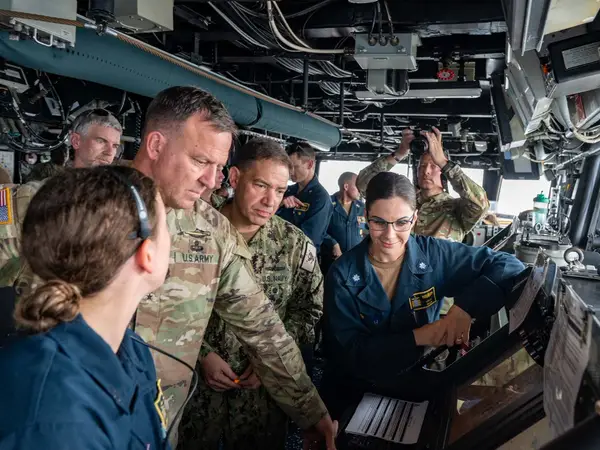As a display of power in the region, US Gen. Michael “Erik” Kurilla commander of CENTCOM sailed through the Strait of Hormuz aboard a Navy warship, August 6-8.
The US Central Command announced on Tuesday that Gen. Kurilla also paid a visit to the United Arab Emirates and Bahrain, two US allies in the Persian Gulf, whose commercial maritime traffic face a constant threat harassment from Iran.
Iran attempted to seize two commercial vessels in early July in the Persian Gulf but was met with a US response and withdrew, according to the Pentagon. Tehran has harassed or seized more than 15 commercial ships in the past two years in the general area of the Persian Gulf.
Anticipating continued Iranian attacks on commercial shipping, the White House had announced in May that the Biden administration would be making moves in the region, but at the time did not say what they would include.
Later, the Pentagon began to augment the US military presence in the region by deploying F-16 and F-35 warplanes in July, and also dispatching three additional naval vessels carrying more than 3,000 sailors, including Marines.
Following Iran's March agreement to a détente with Saudi Arabia facilitated by China, numerous observers have asserted that the United States is experiencing a loss of influence in the Middle East, signaling a potential end to the era of American dominance in the region.
In a perplexing announcement on May 31st, the UAE announced its withdrawal from a US-led maritime security coalition, a move that took place earlier in the year. The UAE further indicated its ongoing evaluation of its security partnerships.
"As a result of our ongoing evaluation of effective security cooperation with all partners, two months ago, the UAE withdrew its participation in the Combined Maritime Forces," the Ministry of Foreign Affairs said in a statement carried by state news agency WAM.
Iran's navy commander said June 3 that his country and Saudi Arabia, as well as three other Persian Gulf states, plan to form a naval alliance, including India and Pakistan.
"The countries of the region have today realized that only cooperation with each other brings security to the area," Iranian army's navy commander Shahram Irani was quoted as saying.
However, this was not confirmed by any of the other countries allegedly involved and seemed to be an Iranian attempt to gain political leverage after the UAE announcement.
The following day, US 5th Fleet and Combined Maritime Forces spokesperson Cmdr. Tim Hawkins told Breaking Defense, a digital news outlet on global military, “It defies reason that Iran, the number one cause of regional instability, claims it wants to form a naval security alliance to protect the very waters it threatens.”
The UAE announcement, however, remained a mystery, without any follow-up confirmation of its withdrawal from the US-led coalition, or a clear denial by the United States. It is possible that Abu Dhabi was exerting pressure on Washington to show more determination in deterring Iranian maritime adventures.
In this context, General Kurilla's recent sea voyage through the Strait of Hormuz, his diplomatic visits to two allied nations, and the bolstering of US naval and aerial capabilities in the region collectively aimed to provide reassurance to Arab allies.
Kurilla visited UAE where he met with Armed Forces Chief of Staff Lieutenant General Issa Saif Mohammed al-Mazrouei. He then traveled to Bahrain where he met with King Hamad bin Isa Al Khalifa, Lieutenant General Abdullah bin Hassan Al Nuaimi, the Bahrain Minister of Defense Affairs, and the US Fifth Fleet Headquarters.
“These trips to the region provide me deep insights into the relationships with our partners and the readiness of the US and Coalition forces deployed there” said Gen. Kurilla. “I continue to be impressed with the high level of readiness, professionalism, and capability of the US forces serving in CENTCOM. The commitment of our forces and partners is key to regional security.”
